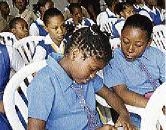Trickle-down education
Published: Tuesday | May 12, 2009

Jamaica's high-school system works for the well-prepared students to receive the education offered. - FILE
The Editor, Sir:
In The Gleaner of Friday, May 8, two very revealing articles on education were published. Bridget Dunkley, in her letter titled, 'Bench warmers', describes an experience that most of us who have dealt with a wide range of students have had at some time in our careers.
She did not name the school, but I would guess that it is one of the generic brands where students who do not score very high marks in GSAT are sent. There are doubtless a few bright students who live close to the school who are bussed away every day to maintain the reputation of some 'brand-name' schools elsewhere in the city.
On reading her letter, I was reminded of a point made to me by an education officer, that we do not seem to realise that teachers too need to be motivated. I was also reminded of a former student of mine who wanted to teach from she was in high school and, after getting her degree, enthusiastically entered the profession, at a school near to her home in Manchester. After the second year, she threw her hands up in the air, not having been able to get a single student in any of her classes to get better than a grade four in English. She left for a brand-name school in Clarendon, where she immediately started to get 80 to 90 per cent of her students to pass. Did some metamorphosis take place in Clarendon to make her a good teacher?
A similar experience
Recently, I met another past student of mine who went through a similar experience as a math teacher. She too left for a brand-name school in St Elizabeth.
In the other article, Peter Espeut tells his own story as a brand-name student who attended a school which is probably the most successful collector of brand-name students in the country. It brought to mind the experiences of acquaintances of mine who lived in the Liguanea area but were refused entry to Espeut's alma mater even though their parents could afford the fees. One of them went to an older, traditional school and ended up with a doctorate later on in life. Numerous stories exist of other students with as high a GSAT score as 88 per cent, who live in the area but who are refused entry to that school, even when a sibling, or some scholarship winner from Mandeville has been accepted.
Rich people everywhere will get their children educated as long as they want to do so. The problem is not that the high-school system in Jamaica works only for the rich, but rather that it only works for the better students, like Espeut, who are well-prepared to receive the education offered. There is no reason to believe that he would not have been as successful at any other school in the country that offered the same course of study. There are examples, too numerous to mention, of Jamaicans who have gone through the lesser-known schools and done as well academically.
Clearly not working
However, the system is clearly not working for the students in Dunkley's class who have been sent a message that their education is not particularly important. They are being given a sort of trickle-down education, to borrow a term from the economists. I wouldn't be surprised if Dunkley spends much of her free time searching the newspapers for openings at brand-name schools. Yet, if she had a few more able students who could inspire her and act as role models for her other students, she might be motivated to stay the course where she is needed most.
I am, etc.,
R. HOWARD THOMPSON
c/o Munro College
roianne@hotmail.com
Munro, St Elizabeth





















